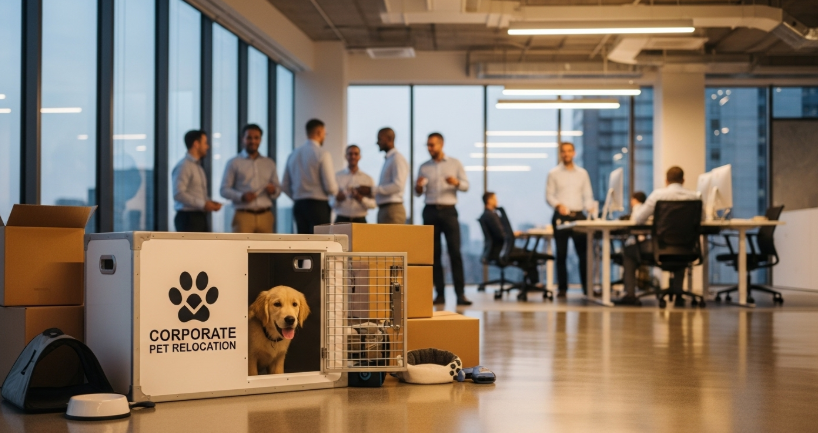Moving to a new city or even another country for work sounds exciting on paper, but anyone who has a pet knows the stress that comes with it. People worry about flight safety, quarantine rules, paperwork, unexpected costs and whether their pet will cope with the change.
These worries are real, and they often become the biggest reason someone hesitates before accepting a relocation offer. As soon as employees start searching for corporate pet relocation, the fear becomes even more obvious—what if the process is too complicated or too expensive?
When employers step in to support pet travel, everything feels lighter. It removes one of the biggest emotional and logistical barriers tied to professional mobility. It also shows a company is paying attention to real life, not just job titles and KPIs. Many organisations, especially global firms, now treat pet support services in the same category as housing assistance, schooling support and moving allowances. And this shift is happening for solid business reasons.
What Makes Relocation Support for Pets Valuable Today?
People’s attachment to animals is stronger than ever. A recent survey from the American Pet Products Association showed that 67% of employees consider their pet a key factor when deciding whether to relocate, and nearly 32% say they would decline a promotion abroad if their pet’s travel arrangements weren’t covered.
When companies make space for this reality, employees feel seen, supported and far more willing to commit to long-term international assignments. It benefits the employer too because relocation becomes smoother, retention improves and teams remain stable.
How Is This Benefit Helping Both Employees and Employers?
It offers:
- Less anxiety about moving
- Faster acceptance of international job assignments
- Reduced risk of last-minute relocation dropouts
- Higher job satisfaction
- Better employer reputation
- Stronger loyalty
Employees can focus on their role instead of spending weeks figuring out health certificates, DEFRA rules, USDA endorsements, IATA-approved crates or country-specific import regulations.
Why Are More Companies Adding Pet Travel Support to Their Relocation Packages?
The shift didn’t happen overnight. It’s a mix of cultural changes, workforce expectations and business needs. Once global mobility teams realised how often assignments failed because of pet-related constraints, they expanded relocation programmes to include veterinary checks, airline bookings, paperwork assistance and in many cases, door-to-door transport handled by accredited IPATA agents or pet travel specialists.
Is the Modern Workforce Dictating This Change?
Absolutely. Millennial and Gen Z employees treat pets as part of the family. HR departments have seen this trend strongly reflected in surveys, internal feedback forms and exit interviews. For example:
- Millennials make up the largest share of pet owners globally (around 33%)
- Over 70% of Gen Z professionals consider pet welfare essential when making career decisions
- Employees with pets are 20–25% more likely to negotiate relocation terms
Companies adopting this benefit aren’t being generous for the sake of it—they’re responding to clear data.
How Does Supporting Pet Travel Improve Employee Retention?
Employee turnover is expensive. Replacing one senior employee can cost up to 213% of their annual salary, according to the Centre for American Progress. When someone declines a relocation offer over pet-related concerns, the employer loses months of planning, recruitment, onboarding and training investment.
Does Pet Support Really Influence Loyalty?
Real-world cases suggest yes. Here’s an example:
A technology firm in London introduced pet travel support to encourage staff to accept overseas assignments. Within one year:
- Relocation acceptance rates increased from 62% to 87%
- Assignment dropouts due to pet concerns dropped to zero
- Average assignment duration increased by 14 months
When employees know a company is willing to handle everything from microchip scans to customs clearance at Heathrow, they stay longer and worry less.
Are Companies Using Pet Travel Support to Attract Global Talent?
Hiring internationally is becoming normal. Talent doesn’t stick to borders anymore, but relocation barriers still exist. Pets often become the hidden hurdle preventing someone from moving across continents.
Why Is This Benefit Attractive to Skilled Workers?
Because it directly removes an emotional burden.
Highly skilled professionals—engineers, researchers, finance experts, creative directors—are often recruited across borders. Many have strong incomes, established homes and long-term pets. They don’t want stress; they want stability.
Relocation support covering:
- DEFRA export paperwork
- USDA endorsements
- Veterinary certificates
- Rabies titres
- IATA-compliant crates
- Flight logistics
- Customs brokerage
- Airport-to-home transport
…makes the offer far more appealing.
How Does This Compare to Traditional Relocation Perks?
Traditional perks typically include:
| Standard Relocation Benefit | Pet-Related Equivalent Offered by Modern Companies |
| Housing allowance | Temporary pet boarding or pet-friendly accommodation |
| Moving allowance | Pet travel crate reimbursement |
| Visa & immigration help | Veterinary paperwork and compliance checks |
| Family relocation support | Breed-specific guidance and airline booking |
| Temporary housing | Pet-friendly hotel stays |
This table highlights how companies are now aligning pet support with existing relocation structures.
What Makes Pet Travel So Complicated for Employees Handling It Alone?
Anyone who has ever tried organising international animal travel knows it feels like handling a mini immigration process. There are rules around microchips, vaccination timelines, health checks, airport procedures, and breed restrictions. Each country—Canada, Australia, Japan, Singapore, UAE—has its own compliance list.
What Parts of the Process Confuse Employees Most?
Employees often struggle with:
- Understanding airline requirements (IATA regulations, aircraft type limits)
- Timing vaccinations correctly (21-day wait rules)
- Government paperwork (GB export certificates, USDA APHIS forms)
- Transport coordination during multi-leg flights
- Country-specific quarantine requirements
- Pet acclimation and crate training
- Unexpected fees for customs or veterinary inspections
This is where employer-sponsored support becomes essential.
How Does Supporting Pet Travel Improve Mental Wellbeing?
The mental load of moving abroad is already heavy. Add concerns about a pet’s safety, and stress levels rise quickly.
Why Is Emotional Support a Major Factor?
Because pets act as emotional anchors. Research from Harvard Medical School shows that pet companionship helps regulate cortisol levels and supports psychological stability during high-stress transitions.
When employees don’t need to worry about:
- Long flights
- Transit risks
- Extreme temperature restrictions
- Delayed documentation
- Missing paperwork
- Country-specific bans
…their mental wellbeing is far better during relocation.
Real Life Example
An employee relocating from Manchester to Toronto shared that the pet travel process was more stressful than the move itself. After her employer partnered with a professional relocation provider, she said the process felt “relaxed and manageable,” and she accepted her next assignment without hesitation.
Are Companies Offering This Because Remote Work Changed Expectations?
Remote and hybrid working normalised flexible lifestyles. Many employees adopted pets during lockdowns—leading to the “pet boom.”
How This Shifted Employer Responsibility
Companies realised:
- Employees expect emotional consideration
- Wellbeing policies must match modern realities
- Flexibility now extends beyond work hours
- Relocation resistance increases when pets are involved
Adding pet travel support became a natural extension of wellbeing and mobility programmes.
How Important Is Compliance When Managing Animal Travel?
Countries take biosecurity seriously. A small mistake such as missing a microchip date or incorrect vaccination documentation can lead to:
- Extended quarantine
- Rejected entry
- Expensive delays
- Rescheduled flights
- Animal stress
- Government penalties
Why Companies Prefer Using Specialists
Specialised services are familiar with:
- Airline rules from British Airways, Lufthansa, KLM, Emirates
- Country-specific requirements for Australia, New Zealand, Singapore, Japan
- DEFRA and EU Pet Travel Scheme regulations
- Microchip and vaccination timelines
- Breed restrictions and heat-sensitive breeds
- IATA Live Animal Regulations
- Airport veterinary checks
Using experts reduces risk for both employee and employer.
Can This Benefit Improve Global Mobility Programme Success?
Yes. When relocation is smooth, assignments start on time, productivity remains stable and fewer projects face delays.
How It Improves Mobility Metrics
Mobility teams track:
- Acceptance rates
- Assignment dropouts
- Project delays
- Compliance errors
- Employee satisfaction
Adding pet travel assistance noticeably improves all these metrics. Many companies report fewer escalations related to relocation.
Do Companies View This as an Investment or an Expense?
It’s an investment. The cost of supporting pet travel is minimal compared to losing a skilled professional or delaying a major project.
Example of Cost Comparison
| Situation | Estimated Cost |
| Losing an employee who cancels a relocation | 150%–200% of annual salary |
| Quarantine delays due to incorrect paperwork | £800–£3,000 |
| Average pet travel support plan | £1,200–£2,800 |
The investment clearly protects larger budgets.
Why Are HR Teams Encouraging This Benefit?
HR departments recognise that employee satisfaction depends on real-life support. It also strengthens company culture and employer branding.
HR Motivations Include
- Encouraging long-term retention
- Supporting mental wellbeing
- Reducing relocation refusals
- Improving employer reputation
- Eliminating barriers for international moves
- Showing genuine care for employees’ families
Pets are part of the family, and HR policies are beginning to reflect that.
How Does Pet Support Improve Company Culture?
When a company demonstrates empathy, trust grows. Employees talk about these benefits with colleagues, new hires and friends. It shapes brand identity.
Culture Advantages
- Stronger sense of belonging
- Higher internal advocacy
- Improved morale during stressful moves
- More positive onboarding experiences
- Stronger bonds between global teams
Employees feel respected beyond their job description.
Are There Industry Trends Behind This Shift?
Yes. Sectors with high mobility demands are adopting this benefit faster:
- Technology
- Finance
- Consulting
- Engineering
- Oil & Gas
- Pharma
- Defence
- Global retail
- Aviation
- Higher education
These industries rely heavily on global talent.
Why These Sectors Lead
Because they frequently send employees abroad and understand that relocation friction reduces operational efficiency.
What Are the Most Common Pet Support Services Employers Provide?
Employers are offering structured support packages that may include:
- Veterinary health checks
- Government endorsements
- Crate fitting and acclimation
- Door-to-door transport
- Pre-flight assessments
- Booking on pet-friendly airlines
- Customs and import coordination
- Destination handling
- Temporary boarding or pet hotels
- GPS tracking
- Airport meet-and-greet
These are typically delivered through IPATA-accredited agents, DEFRA-certified handlers and authorised veterinary clinics.
How Do Companies Ensure the Process Is Safe for Animals?
Safety is the top priority.
Safety Measures Often Included
- Temperature-controlled holding areas
- IATA-approved crates
- Stress-reducing handling techniques
- Pre-flight hydration routines
- Vet-approved calming strategies
- Direct flights whenever possible
- Route planning for extreme weather
- Handling by trained live-animal teams
- Breed-specific travel adjustments
These measures reduce risk and make pets more comfortable during long international journeys.
What Mistakes Do Employees Commonly Make Without Support?
Without employer-backed assistance, employees often:
- Misinterpret vaccination timelines
- Book flights incorrectly
- Choose airlines with poor pet handling standards
- Purchase wrong crate sizes
- Forget endorsement dates
- Fail to prepare pets for crate hours
- Miss airport vet inspections
- Underestimate costs
This leads to unnecessary stress and financial surprises.
How Do Employer Support Programmes Add Predictability?
Relocation becomes far smoother when every step is planned with precision.
Predictability Employees Appreciate
- Clear timelines
- Transparent costs
- Professional handling
- Guaranteed compliance
- No last-minute paperwork issues
- Expert communication
- Reduced risk of flight cancellations
Predictability builds trust in both the process and the employer.
What Does the Future of Pet Support in Relocation Look Like?
As more companies globalise, this benefit will expand further. It may soon become as standard as moving expenses and visa assistance.
Expected Trends
- Partnerships with international pet travel providers
- Inclusion of exotic pets (birds, reptiles, small mammals)
- Built-in wellness monitoring for pets during transport
- Smart crate integrations for temperature and motion tracking
- Enhanced digital documentation systems
- Standardisation of pet travel across mobility packages
Companies will begin offering this as a core benefit, not a luxury.
Conclusion
Relocating for work is a major decision, and pets are a major part of that decision. When employers understand this and take steps to support the process, mobility programmes run more smoothly, employee loyalty grows, and relocation acceptance increases dramatically. Offering pet travel assistance is no longer an unusual perk—it’s becoming a practical requirement for modern organisations that move talent around the world. By supporting employees through detailed planning, professional handling and compliance assistance, companies create an environment where international assignments feel manageable rather than overwhelming.
For those looking for reliable professionals who understand global pet travel inside out, Pearl Lemon Pet Transport is a trusted name ready to support the journey.


